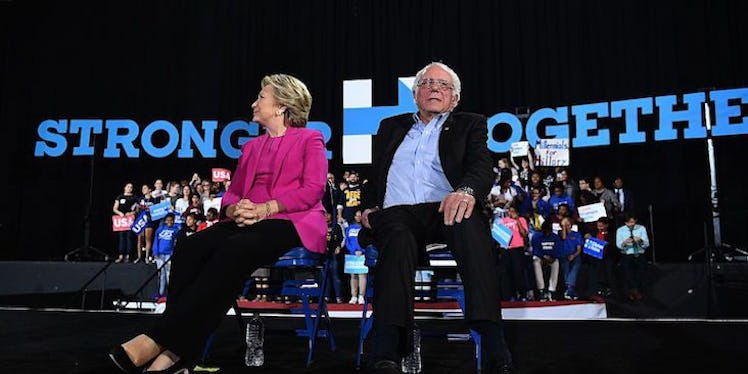
Bernie Sanders Doesn't Want To Hear Hillary Clinton Talk About The Election
Hillary Clinton opened up about why she thinks she lost the 2016 election in her upcoming book, What Happened. Part of this analysis of course included discussions on the effect of Bernie Sanders. Sanders responded to Clinton's book on Wednesday, Sept. 6, essentially shrugging her criticism of him and his campaign off.
The book isn't out yet, but reports are coming in about some of the content of it. This includes portions of what Clinton has to say about Sanders. The two faced off in a contentious primary battle for the Democratic nomination, which Clinton ultimately won by over 3 million popular votes -- roughly the same as her win in the popular vote during the general election.
"My response is that right now it's appropriate to look forward and not backward," Sanders told The Hill. He added that he's busy working on overturning Donald Trump's DACA decision, getting $15-an-hour minimum wage, and presenting a Medicare-for-all health care system.
Sanders' campaign focused on his economic dreams to take power from the billionaires and also get everyone to college for free. Clinton's campaign focused on detailed plans and a legacy of collaborating across party lines. They both ran on a campaign of not being Russian-associated fascists.
Throughout the primaries, as two competitors are wont to do, they criticized each other. This included Sanders, an Independent, showing Clinton as an "unqualified" D.C. establishment persona with shady ties to Wall Street. Trump, too, showed Clinton as an unqualified D.C. establishment persona with shady ties to Wall Street.
So in her book, Clinton writes that Sanders "had to resort to innuendo and impugning my character" because they actually agreed on most real political points, according to CNN. Clinton also wrote about the very real (can personally attest) harassment of Clinton supporters and those who tweeted about Clinton by "Bernie Bros," whose tweets quite often veered into sexist territory.
"When I finally challenged Bernie during a debate to name a single time I changed a position or a vote because of a financial contribution, he couldn't come up with anything," Clinton wrote. She went on to say that Sanders' campaign "caused lasting damaged" which paved "the way for Trump's 'Crooked Hillary' campaign."
"Our job is to go forward," Sanders told The Hill about Clinton's claims in the the book.
There are arguments on both sides to this response. On the one hand, Clinton is unequivocally allowed to talk about her experiences in the 2016 election. It was an historic run, and she should have a space for her voice to mark it in history.
And on that side, it is also appropriate to examine exactly, well, what happened in 2016, given that the end result was such a massive surprise and markedly changed history, American society, and the lives of many people. Especially if you are one concerned with the rise in public white supremacy in America right now, it is more than appropriate to look back at what went down in the election to understand why this is happening and what can be done about it (or what shouldn't be done about it).
On the other side, Sanders is still in the Senate, so he still has work to do, as he said. He's got more pressing things to consider in his daily work than a campaign he hung out in a year ago.
That said, one has to wonder about Sanders' lack of acceptance of responsibility for his supporters' actions during the election, from storming out of the Democratic National Convention -- unveiling a lack of party unity -- to the "Bernie Bro" sexist attacks to the 1 in 10 who voted for Trump. After all, Clinton was lambasted by critics for failing to take enough responsibility for losing the election when she deigned to mention other factors after saying she took "absolute personal responsibility" for it in an appearance this spring.
Throughout the primaries, Sanders consistently got away with things Clinton never could -- a messy appearance, campaign ideas without thorough plans, a raised voice, literally flipping parties for an election -- so who's to say the reaction to their post-election analyses will be any different.